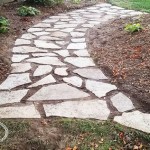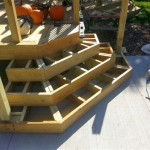Landscaping Ideas Patio Blocks: Essential Aspects to Consider
Patio blocks are a versatile and durable option for creating attractive and functional outdoor spaces. Here are some essential aspects to consider when selecting and installing patio blocks for your next landscaping project:
Material and Durability
Patio blocks are typically made from concrete, clay, or natural stone. The material of your blocks will affect their durability, appearance, and cost. Concrete blocks are affordable and offer a wide variety of styles, but they may not be as durable as clay or natural stone. Clay blocks are more durable and fade-resistant than concrete, but they are also more expensive. Natural stone blocks are the most durable and aesthetically pleasing but also the most expensive.
Size and Shape
The size and shape of your patio blocks will impact the overall look and feel of your patio. Small blocks can create a delicate and intricate pattern, while larger blocks can give your patio a more imposing and stately appearance. Square and rectangular blocks are popular choices, but you can also find blocks in a variety of other shapes, such as hexagons, octagons, and circles.
Color and Texture
Patio blocks come in a wide range of colors and textures. The color and texture of your blocks will help you achieve the desired look for your patio. Earth tones like brown, beige, and gray are popular choices, but you can also find blocks in a variety of bright and vibrant colors. The texture of your blocks can also add visual interest and depth to your patio.
Installation
The installation of patio blocks is a relatively straightforward process, but it is important to follow the manufacturer's instructions carefully. First, you will need to prepare the base by removing any existing grass or vegetation and then leveling and compacting the soil. Next, you will need to lay a layer of sand on top of the base and then begin laying your patio blocks. It is important to work slowly and carefully, making sure that each block is level and secure. Once your patio blocks are in place, you will need to fill the joints between the blocks with sand and then compact the entire area.
Maintenance
Patio blocks are relatively low-maintenance, but there are a few things you can do to keep them looking their best. Regularly sweep or blow off any debris, and occasionally use a mild detergent to clean the blocks. If you notice any stains, you can try removing them with a commercial cleaner or a mixture of baking soda and water. Patio blocks are also susceptible to damage from freezing and thawing, so it is important to seal them before winter.

Top 60 Best Paver Patio Ideas Backyard Dreamscape Designs Outdoor Pavers

Paver Patio Ideas Landscaping Network

Budget Garden Patio Ideas Marshalls

Brick Patio Ideas Landscaping Network

Stone Patio Ideas For Michigan Homeowners Design One Landscaping

40 Best Patio Ideas With Fireplace Traditional Designs For Outdoor Living Stones Diy Backyard Stone

Simple And Affordable Brick Patio Design Able Plan Mypatiodesign Com

40 Patio Pavers Ideas Design For Paved Patios

49 Landscaping Ideas With Stone Backyard

Top 11 Garden Patio Design Ideas Paving Direct








